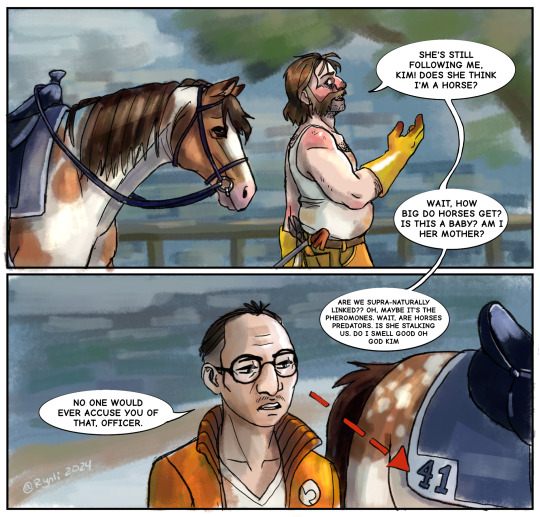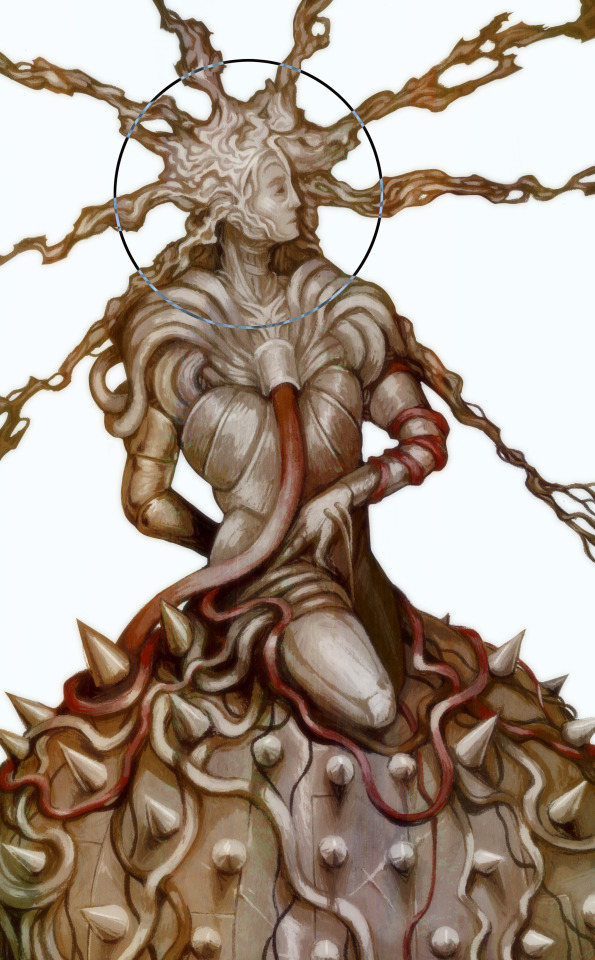#logic
Explore tagged Tumblr posts
Text
VISUAL CALCULUS - That's it. You got it.
YOU - Got what?
VISUAL CALCULUS - The whole shebang.
You - Shebang?
VISUAL CALCULUS - The coat, the hat, the swindle so crooked a yeggman couldn't break it.
RHETORIC - Yeggman... that's either a safebreaker or someone who works almost exclusively with egg yolks.
LOGIC - The deaths of Charlie Spillane and Deanna Deneuve, the case Dick Mullen was on -- that's what this crooked swindle must be.
YOU - Wait, why are you talking like that?
VISUAL CALCULUS - This is how I always talk. Move on. The swindle -- cracked it like a discount safe.
COMPOSURE - You're right, he used to be more polite.
RHETORIC - Classic case of Mullen-mania, a well-documented condition.
ELECTROCHEMISTRY - This is why you should never read books.
#disco elysium#intellect#visual calculus#rhetoric#logic#motorics#composure#physique#electrochemistry#harry du bois
61 notes
·
View notes
Text
why do baby seals look like they're on the verge of tears constantly. they legit have NO reason to be that upset.

#silly#relatable#seal#seals#sea creatures#why#memes#this doesnt make sense#logic#cute animals#baby animals
2K notes
·
View notes
Text
Throwing a fun wrinkle into the abstruse verbal logic puzzles securing various parts of my domain by including a small random chance that any given guard is actually just a normal guy doing a bit.
1K notes
·
View notes
Text



from what Jean says, they got the MC very recently… some vignettes about how the vehicle quest would go if Harry still had his horse
Bonus horrible thumbnails under the cut


#disco Elysium#Harry du bois#Kim kitsuragi#disco Elysium skills#cuno de ruyter#fanart#logic#authority#horse#comic#I have a goal to draw him more fucked up eveey time#I didn’t realize until after coloring that he has the EXACT same expression in the third page as his player portrait#it’s fine it’s just canon#rynArts#this coloring style takes so much longer but I feel compelled to do it#for disco
2K notes
·
View notes
Text
If you see articles and tweets about how the Star of David is now a symbol of fascism and think to yourself "maybe they have a point," then whatever you define as your antizionism has absolutely crossed the line into antisemitism
The Star of David is one of the most important symbols in Judaism. The fact that it is on the flag of Israel does not make it fascist. The government of Israel is separate from the symbol. Labeling such a widely used symbol by a marginalized people as fascist is incredibly dangerous and seeks to conflate Jews as a whole with the Israeli government- something antizionists continually claim people shouldn't do. So why are some doing it?
High control groups slowly ease you into believing nonsensical things. They provide "reasoning" and "logic" which goes largely unchallenged within echo chambers. People in these echo chambers are prone to believing it because they start to see it as real logic instead of bigoted, twisted reasoning. Even otherwise intelligent people can fall for their prejudices as they begin to view it as a form of justice
It is a fantasy that high control group leaders go from 0 to 100 in five minutes or refuse to answer any questions- they are usually much more manipulative
Please confront your biases. The Jews are tired
#jumblr#jewish#jews#jew#antisemitism#antisemites#antisemitic#bias#social justice#liberal#justice#judaism#feminism#intersectional feminism#intersectionality#star of david#religion#left#leftist#high control groups#echo chamber#marginalized communities#logic#fascisim
3K notes
·
View notes
Text
I feel really cheated by the Logic class I took in college. The subject was objectively fascinating and the textbook was actually interesting to read all on its own, which is the only reason I learned anything at all about rhetoric because the professor would get on stage and ramble for three hours about nothing.
Also when I related this to my wife they asked if it was taught in an auditorium and to this I clarify, no. It was a tiny classroom of twenty students who just sat there while this sixty year old white dude waxed poetic about how women’s reproductive rights were going to be terminated by the Russian regime. This was back in 2013 so he wasn’t entirely wrong I guess but I’d rather have learned Logic.
He tested us verbatim from the text book and never once touched on those topics in his lectures. It goes without saying he had tenure.
Because I learned nothing in class I’d often skip his insane rants. This was fine because he used the same attendance sheet all week long so as long as I was there Monday and Friday I didn’t get docked attendance. He did once issue a vague warning that those of us taking advantage of his system were only hurting ourselves before continuing to reminisce about the time he visited Amsterdam.
I also saw him sometimes outside of class.
When he came into the sex shop.
To buy poppers.
Which is how I learned my insane Logic professor was a gay dude who would troll the local gay bar and take home guys half his age. My coworker had seen him do this on numerous occasions.
When I rang him up I said, “Hi Professor.”
He was not even a little fussed to see me behind the counter and greeted me by name. I rang up his poppers, and later got an A in his class. I earned it, don’t worry. Aside from attendance I got 100’s on every quiz.
But I still think about what I could’ve learned if my professor hadn’t been a tenured gay dude whose only desire to screw dudes half his age.
789 notes
·
View notes
Text

I CAN FEEL YOUR FEAR AS YOU TREAD THE ENDLESS EXPANSE OF MY MIND
2K notes
·
View notes
Text
mathematical revelation so great i almost became religious
1K notes
·
View notes
Note
Why do you ship shoko and geto even tho shoko flat out said she wouldn’t date him and or gojo? I’m sorry if this rude I’m just genuinely curious what do you see in the ship
she said she wouldn’t date them, she never said anything about not getting freaky nasty and mashing parts with them dirty style
403 notes
·
View notes
Text

680 notes
·
View notes
Quote
The habit of logical thinking kills imagination.
Lev Shestov, All Things Are Possible
#philosophy#quotes#Lev Shestov#All Things Are Possible#logic#reason#rationality#creativity#imagination
666 notes
·
View notes
Text
The fun thing about the knights and knaves puzzle is that no matter what goofy variant you come up with, not only has it already been considered, some maniac has worked out the optimal solution. What if there's a third guard who lies or tells the truth at random? It's been done. What if the guards will only answer yes/no questions, and also for some reason they understand your language but refuse to speak it, and you don't know which of the two words they may respond with means "yes" and which means "no"? Literal thesis papers have been written on that one. Logicians are absolute freaks for these guys.
3K notes
·
View notes
Text
It's so funny to me that people think of Math/Mathematicians as being hyper-logical and rational. Like, have you seen some of the wild things hiding in the Math?
Did you know there are non-computable numbers?? (https://en.wikipedia.org/wiki/Chaitin%27s_constant)
Did you know that there are things that are true, but we can't prove them??? (https://en.wikipedia.org/wiki/G%C3%B6del%27s_incompleteness_theorems)
Did you know that we can prove that something exists, and yet never actually figure out what that thing is?? (https://mathworld.wolfram.com/NonconstructiveProof.html)
Math is crazy. Math is wild. Math hardly makes sense, and when you think you understand the weirdest parts of it, everyone who hears you explain it to thinks you're a gibbering lunatic.
"In mathematics you don’t understand things. You just get used to them." - von Neumann
(please share more unhinged math with me, i want to see more scary math)
#stem#math#mathblr#academics#mathematics#logic#stemblr#academia#proofs#computer science#theoretical computer science
3K notes
·
View notes




